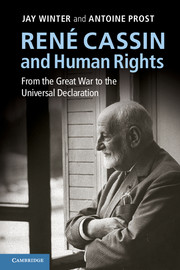Book contents
- Frontmatter
- Contents
- List of plates
- Preface and Acknowledgments
- Introduction to the English edition
- List of Abbreviations
- Part I In the shadow of the Great War
- 1 Family and education, 1887–1914
- 2 The Great War and its aftermath
- 3 Cassin in Geneva
- 4 From nightmare to reality, 1936–1940
- Part II The jurist of Free France
- Part III The struggle for human rights
- Index
- Plate section
- References
3 - Cassin in Geneva
Published online by Cambridge University Press: 05 April 2013
- Frontmatter
- Contents
- List of plates
- Preface and Acknowledgments
- Introduction to the English edition
- List of Abbreviations
- Part I In the shadow of the Great War
- 1 Family and education, 1887–1914
- 2 The Great War and its aftermath
- 3 Cassin in Geneva
- 4 From nightmare to reality, 1936–1940
- Part II The jurist of Free France
- Part III The struggle for human rights
- Index
- Plate section
- References
Summary
In the inter-war years, René Cassin became a soldier in another kind of war, one waged against war itself. His point of entry into international politics was the international veterans’ movement, launched with the aid of the ILO in Geneva in the early 1920s. There too, between 1924 and 1938, he served as a member of the French delegation to the League of Nations. His place at the table in Geneva was as the official representative of the French veterans’ movement. Year after year, the UF formally proposed his name for this post. Indeed, Cassin himself drafted the letter signed by the Federation’s president, making this request, and dispatched it to the office of the head of the government. And each year until 1938, Cassin travelled to Geneva and spent the month between about 10 September and 10 October at work on League of Nations business. In Geneva during the disastrous Munich accords of 30 September 1938, he decided not to return thereafter to the League, which to all intents and purposes had collapsed.
Over the years he spent in Geneva, he was joined by a remarkable assembly of men, in the ILO in its early days under Albert Thomas, and in the League itself. In 1926, for instance, Aristide Briand, Louis Loucheur, and his old friend from student days in Paris, Marcel Plaisant, served on the League’s first commission, devoted to juridical questions. Léon Jouhaux, the designated representative of the French trade union movement, served on the second commission, devoted to economic questions. In the same year – 1926 – Cassin joined Joseph Paul-Boncour, Jouhaux and Henri de Jouvenel on the third commission, which focused on disarmament. In other years Cassin also served on the fifth commission, devoted to humanitarian matters, and on the sixth commission, responsible for what were termed political questions.
- Type
- Chapter
- Information
- René Cassin and Human RightsFrom the Great War to the Universal Declaration, pp. 51 - 79Publisher: Cambridge University PressPrint publication year: 2013



